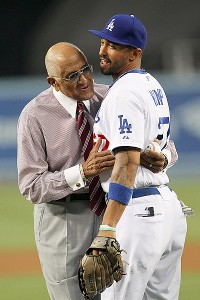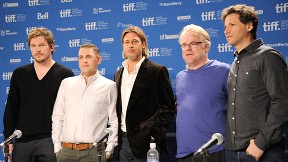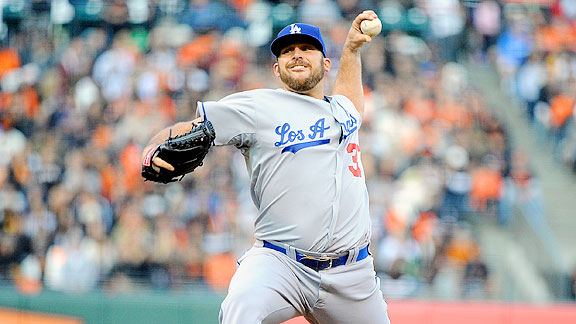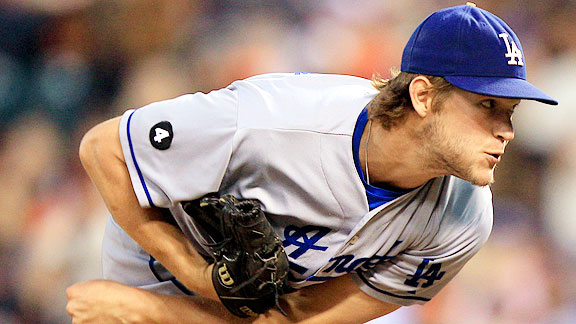Ready to put 2011 behind you? The Dodgers have released their preliminary 2012 schedule. After beginning this season on March 31, Opening Day 2012 comes on April 5 (a Thursday) at San Diego. Tony Jackson of ESPNLosAngeles.com has more:
The Los Angeles Dodgers will begin the 2012 regular season with a four-game series against the San Diego Padres at Petco Park April 5-8. Following an off-day, the team then will begin the home half of its schedule on April 10 against the Pittsburgh Pirates, kicking off a six-game homestand that also will include three more games against the Padres.
Major League Baseball released the 2012 regular-season schedule on Wednesday.
The interleague portion of the Dodgers’ schedule includes the usual six-game, home-and-home series with the Los Angeles Angels, who will visit Dodger Stadium June 11-13. The Dodgers then will play at Angel Stadium in Anaheim June 22-24.
Additionally, the Dodgers will host the Chicago White Sox June 15-17 and visit the Seattle Mariners June 8-10 and the Oakland A’s June 19-21.
The Dodgers will finish the first half with a four-game series against the Arizona Diamondbacks at Chase Field July 5-8, then return home immediately after the All-Star break to begin the second half against the Padres on July 13.
The Dodgers finish the season at home with a six-game stand against the Colorado Rockies Sept. 28-30 and San Francisco Giants Oct. 1-3.
The schedule remains subject to change, and certain specifics such as starting times and day games/night games have yet to be finalized.
* * *
- Former Dodgers executive and current Diamondbacks CEO Derrick Hall is profiled by Vincent Bonsignore of the Daily News in a story that is well worth your time.
- The McCourt ownership saga, which has been in a quiet period of late, resurfaces today in a hearing in which attorneys for Frank and Jamie fight over bill payments and spousal support, reports Bill Shaikin of the Times. Shaikin notes that the all-important issue of whether McCourt will be allowed to auction the Dodgers’ future TV rights has been delayed indefinitely.
- ESPN.com baseball analyst and former Blue Jays exec Keith Law reviewed “Moneyball” at his personal blog – and hated the film, both as cinema and as a depiction of the book.
There’s no doubt the film takes liberties on the baseball front and has some legitimate flaws, but I disagree with Law on a number of points – such as the idea that the secondary characters, from Art Howe to the scouts, are one-dimensional buffoons. I think it’s very clear that these guys are real people, men to be respected, and that there’s a real conflict going on, not a steamrolling of ne’er-do-wells.
At one point, Law criticizes the movie for staging a scene in which Beane crosses the country to discuss a trade in person with Cleveland’s general manager, because that wouldn’t happen, then later criticizes the movie for a scene in which Beane talks on the phone with the same GM, because it’s boring to watch him talk on the phone. Hard to win.
I definitely expect some will be so put off by the film’s inaccuracies that they won’t be able to enjoy it, but I still think it stands up overall.
- Here’s an excerpt of what Jackson wrote late Tuesday for ESPNLosAngeles.com on Chad Billingsley.
… Billingsley’s pitch count was high again in this one, but that was mostly due to those first three innings. From the fourth on, we saw the dominating pitcher we know Billingsley can be, which makes it all the more maddening that we don’t see that guy more often.
Those previous three starts lent themselves to all sorts of speculation, such as whether Billingsley was feeling OK physically. I went so far as to ask pitching coach Rick Honeycutt that question during last weekend’s series in San Francisco, whereupon Honeycutt said if Billingsley was hurting, he wasn’t admitting it. That appears to be a moot point now.
What Honeycutt did say was that Billingsley had lost command of his fastball — the pitch that sets up the effectiveness of all his others — and it probably was a mechanical issue having to do with his release point. Whatever it was, it wasn’t much of a problem against the Diamondbacks. …
- Update: Jerry Crasnick of ESPN.com has a glowing portrait of Matt Kemp and Clayton Kershaw.







